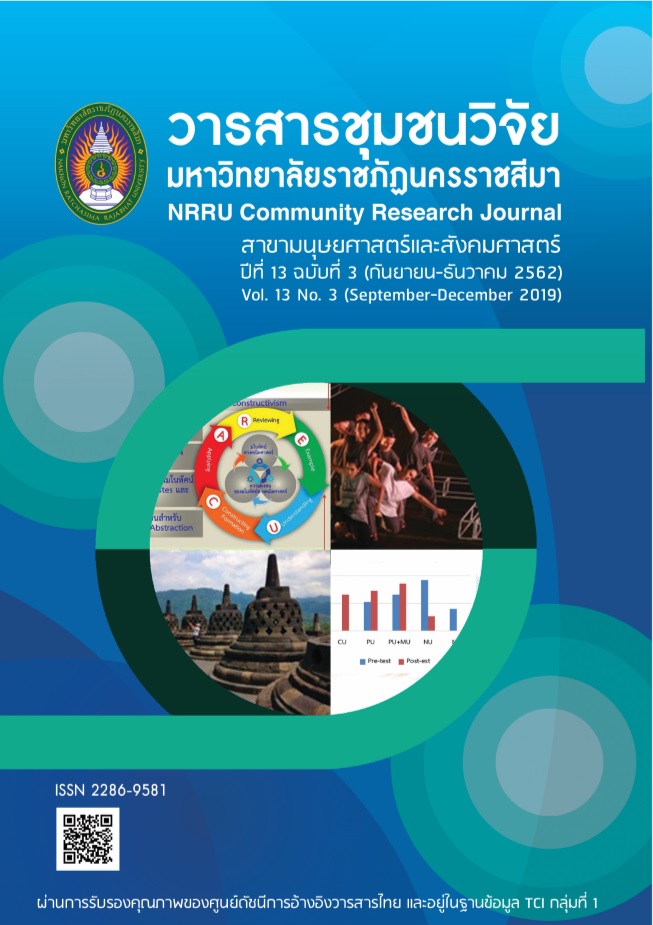THE EFFECT OF PRODUCT INNOVATION AND SERVICE PROCESS INNOVATION ON MARKETING PERFORMANCE OF 3 TO 4 STARS HOTEL BUSINESSES IN THAILAND
DOI:
https://doi.org/10.14456/nrru-rdi.2019.58Keywords:
Product innovation, Process innovation, Marketing performanceAbstract
This objectives of this research which particularly focus on 3 to 4 stars hotel business in Thailand are to: 1) study product innovation and process innovation of 3 to 4 stars hotel businesses in Thailand, 2) study the market performance of 3 to 4 stars hotel businesses in Thailand and, 3) study the magnitude of the effects of product innovation and process innovation on marketing performance of the 3 to 4 stars hotel businesses in Thailand. The target groups are among managers of 3 to 4 stars hotel businesses in Thailand. Questionnaires were distributed to 149 samples. Probability Sampling is used to randomize the samples. Then, using Quantitative Analysis Method to further analyze using several factors based from Descriptive Statistics, which are the mean, standard deviation as well as the multiple regression analysis. The results indicate that process innovation is at the highest ( =4.08), followed by product innovation (
=3.78) of 3 to 4 stars hotel businesses in Thailand. The overall marketing performance of 3 to 4 stars hotel businesses in Thailand also at a high level (
=3.83). Moreover, it was found that product innovation (
= 0.35) and process innovation (
=0.38), are all contributed a positively impact on the marketing performance of the 3 to 4 stars hotel business in Thailand.
References
Akgun, A. E., Keskin, H., & Byrne, J. (2009). Organizational emotional capability, product and process innovation, and firm performance: An empirical analysis. Journal of Engineering and Technology Management, 26, 103-130.
Bangkok Business Politics. (2015). The service sector .... The new driving force of the Thai economy?. Retrieved February 9, 2018, from https://www.bangkokbiznews.com/blog/detail/634356 (In Thai)
Chuang, L. M., Liu, C. C., Tsai, W. C., & Huang, C. M. (2010). Towards an analysis framework of organizational innovation in the service industry. African Journal of Business Management, 4(5), 790-799.
Chunanapiya, N. (2012). The influence of marketing innovations and marketing environments on the marketing performance of four and five star hotels in Thailand. Journal of The 13th Graduate Research Conference, Khon Kaen University, 104-113. (In Thai)
Department of Tourism, Ministry of Tourism and Sports. (2014). 1-4-star standardhotel in Thailand. Retrieved February 9, 2018, from https://thaihotels.org/wp-content/uploads (In Thai)
Euosilaongkol, N. (1998). Service Quality Development of Bank of Ayudhya Public Company Limited during the IMF era in Nakhon Ratchasima province. Nakhon Ratchasima : Wongchawalitkun University. (In Thai)
Gunday, G., Ulusoy, G., Killic, K., & Alpkan, L. (2011). Effects of innovation types on firm performance. The International Journal of Production Economics, 133, 662-767.
Hair, J. F., Black, W. C., Bain, B. J., Anderson, R. E., & Tatham, R. L. (2006). Multivariate data analysis (6th ed.). Upper Saddle River. NJ : Pearson Education International.
Khumsing, K., & Phongsart, P. (2019). Attitude of hotel business executives and related parties. Hotel business towards the level of service innovation that affects The excellence of the hotel business in the northeast. Governance Journal Maha Sarakham Rajabhat University. 8(1), 160-179. (In Thai)
Leekpai, P. (2014). Innovativeness of Hotel Business in Southern Thailand. Journal of Management Sciences. 31(1), 69-95. (In Thai)
Mansury, M. A., & Love, J. H. (2008). Innovation, productivity and growth in US business service: A firm-level analysis. Technovation, 28, 52-62.
Ministry of Tourism and Sports. (2018). Press release on tourism situation in December 2018. Retrieved February 9, 2018, fromhttps://www.mots.go.th/ewt_dl_link.php?nid=8404 (In Thai)
Oke, A. (2007). Innovation types and innovation management practices in service companies. International Journal of Innovation Management, 27(6), 564-587.
Phitsuwan. K., Tantiwikul S., & Rinthiwasas J. (2018). Marketing innovations and current market conditions affecting the operating results Hotel operations in Phra Nakhon Si Ayutthaya Province. Journal of Graduate Studies. 15(70), 1-8. (In Thai)
Pinchetch, B. (20115). The Infulence of Organizational Culture on Service Quality of Hotel Industry. Journal of Rajamangala University of Technology Isan, Humanities and Social Sciences, 2(2), 106-118. (In Thai)
Rattanawong, W., Suwanno, N., & Jindabot, T. (2014). Innovation in Service and lTS Measurement in Thailand’sTourism Business: Small and Medium Enterprises. Journal of Management Sciences Prince of Songkla University, 31(1), 119-146. (In Thai)
Rovinelli, R. J., & Hambleton, R. K. (1977). On the use of content specialists in the assessment of criterion- referenced test item validity. Dutch Journal of Educational Research, 2, 49-60.
Si Sa-at, B. (2017). Preliminary research. Bangkok : Suwiriya Sarasan. (In Thai)
Sukanasirikun, K. (2012). The impact of business efficiency on innovation Affecting the operating results of small and medium-sized businesses in Thailand. Journal of Humanities and Social Sciences. 3(2), 17-36 (In Thai)
Tacsir, E. (2011). Innovation in service: The hard case for Latin America and the Caribbean. Compete Caribbean, New York, Washington D.C.
Teng, C. C., & Barrows, C. W. (2009). Service orientation: antecedents, outcomes, and implications for hospitality research and practice. The Service Industries Journal, 29(10), 1413-1435.
Tourism Authority of Thailand. (2017). Accommodation and Hotel. Retrieved January 18, 2017, from https://thai.tourismthailand.org/accommodation/hotel (In Thai)
Vanichbancha, K. (2010). Advanced statistical analysis with SPSS for Windows (8th ed.). Bangkok : Thammasarn. (In Thai)
Walker, R. M. (2004). Innovation and Organizational Performance: Evidence and a Research Agenda. Advanced Institute of Management Research Paper, 2, 55.
Weng, M. H., Ha, J. L., Wang, Y. C. & Tsai, C. L. (2012). A study of the relationship among service innovation customer value and customer satisfaction: an industry in TAIWAN. International Journal of Organizational Innovation, 4(3), 98-112.





